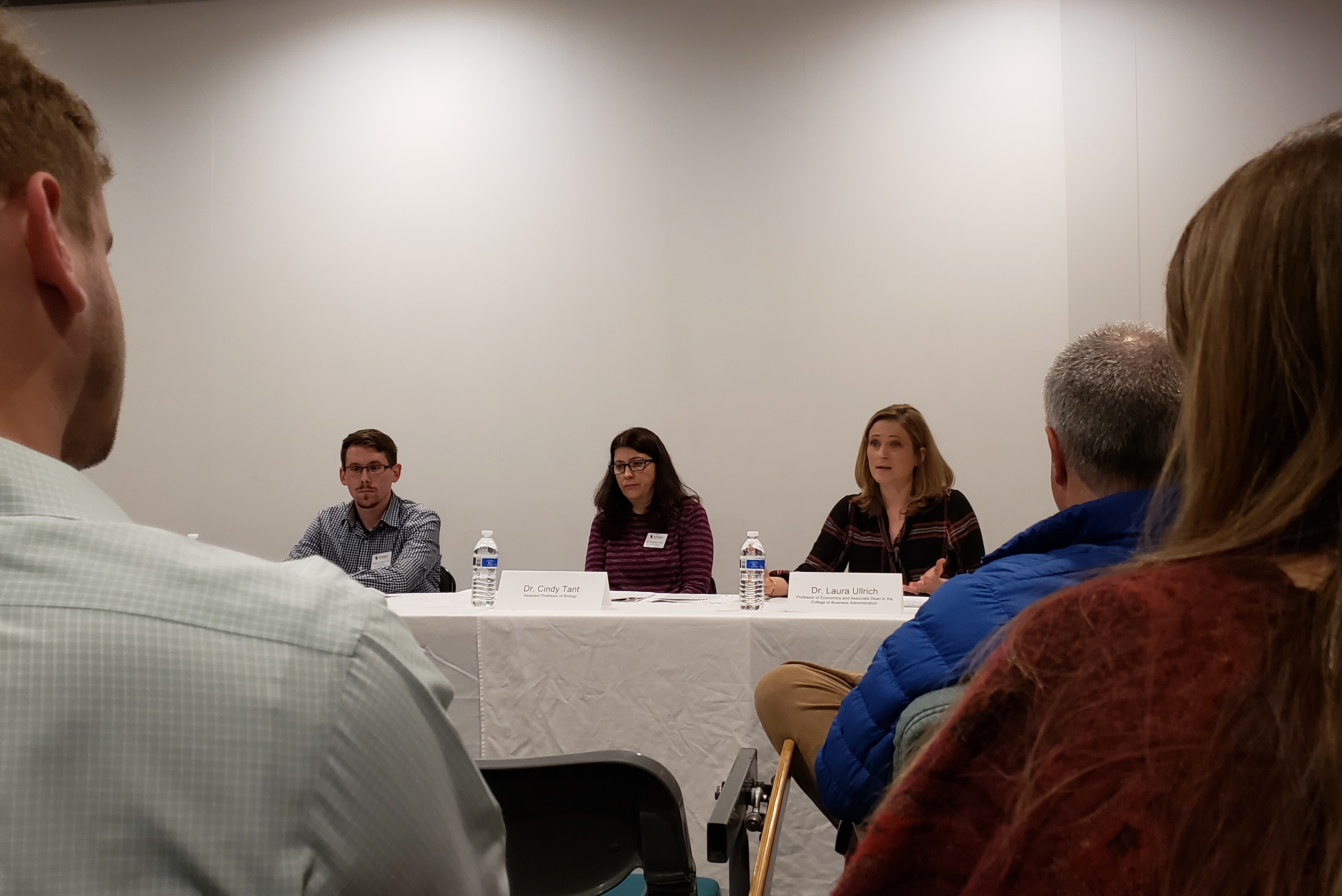Genetically modified foods prove to still be one of the most controversial topics of modern time, as was seen during the “GMOs and our food supply: Good or Bad?” interdisciplinary panel. During this panel, three professors from Winthrop discussed how GMOs in the world’s food supply can be both beneficial and harmful from the perspective of their own disciplines. The panelists included Joshua McDonald of the human nutrition department, Cindy Tant from the biology/ecology department and Laura Ullrich from the economics department. The entire panel was moderated by Marsha Bollinger, the chair of the interdisciplinary studies department. The panelists showed the interdisciplinary nature of genetic modification and how it affects various aspects of life.
The focus on genetically modified foods for the human nutrition department focused on how these foods will affect human health both locally and globally.
“GMO crops have to be submitted to [EPA, FDA, etc.] to be tested for various amounts of compounds, the same with pesticides. One of the drawbacks is a lot of the of that data is not available to the general public…it might say the data shows [GMOs are safe] but as a scientists I look at that data for myself and if it is not out there it’s hard to make that decision,” McDonald said.
McDonald also spoke about how GMOs can benefit human health and society. He pointed out that with GMOs it would be possible to feed the growing population of the world. It was also discussed that GMOs can help make certain foods contain more nutrients, helping developing countries who may be lacking nutrients such as a vitamin A deficiency.
On the biology side of things when discussing GMOs,Tant discussed how GMOs can potentially both harm and benefit the ecosystem.
“From an ecological perspective resistances is one of the biggest concerns with genetic crops. We have both resistant weeds that become resistance overtime to herbicides…we also have resistant insects that become resistant to the Bt corn that is spread with the gene that is toxic to potential pests organisms…a mid 2017 estimate found that 37 weed species have become resistant to glyphosate…this could result to using other pesticides that are less safe,” Tant said.
Although the resistance to various pesticides and herbicides could cause potential harm to the ecosystem, Tant also believed GMOs could benefit the ecosystem. Tant discussed the American chestnut which has been used for building and is good for the ecosystem. However, the American chestnut has been lost due to fungal issues. Tant discussed how scientists have been successful in genetically modifying a chestnut with a wheat gene to get the same benefits the original American chestnut provided. Tant concludes that this shows that GMOs can actually help with the loss of biodiversity within an ecosystem.
The final panelist to discuss the use of GMOs in her field of study was Laura Ullrich, an economics professor. Just as the previous two panelists did, Ullrich discussed both the benefits and harms of using genetically modified foods for food supply. However, Ullrich spoke from an economics perspective, something many do not think about when thinking about genetic modification.
“We can have a similar situation with GMOs [asymmetric information where not everyone knows all the facts of a product] because of the lack of labeling or the lack of science being able to keep up with the testing of genetically modified foods to where you don’t always know what your consuming,” Ullrich said.
Ullrich made the point that asymmetric information in regards to the genetically modified foods is unfair and potentially unsafe for the consumer because they do not have all the facts presented to them. However, Ullrich also discussed some benefits to the economy GMO foods could have.
“There certainly are a lot of pros from an economic point of view. Number one is decrease cost. [GMOs in our food supply] does allow prices to go down over time,” Ullrich said. “Prices of food would be expected to go down or stay stable because you have an increase yield. So farmers are able to sell a larger percent of what they’re producing, they might be able to produce more on the same amount of land they had before.”
In all, GMOs have their pros and cons in all disciplines and remains a controversial subject among many natural and social scientists. However, the majority of the panelists agreed the GMOs cannot be the answer to everything.




